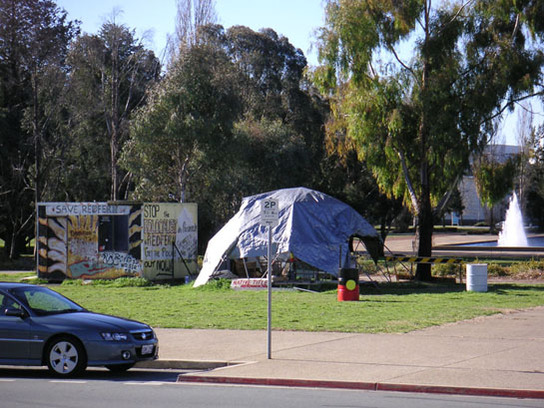23 August 2006
The Special Rapporteur on adequate housing as a component of the right to an adequate standard of living, Miloon Kothari, concluded his visit to Australia on 15 August 2006.
During his visit, which started on 31 July, the Special Rapporteur visited various urban and rural locations, in the Australian Capital Territory, New South Wales, Queensland, Northern Territory, South Australia and Victoria to examine the status of realization of the right to adequate housing in Australia, with particular attention to aspects of gender equality and non-discrimination. Throughout his visit, the Special Rapporteur held extensive talks with representatives of the Australian Government at federal and state level, and with representatives of the civil society, including social workers, support services, academics, women groups and Indigenous representatives.
On the last day of his mission, the Special Rapporteur shared his preliminary observations with the Australian authorities. Whilst he took note of some positive initiatives and programs from the part of the Government (such as the Supported Accommodation Assistance Program (SAAP) or the “fixing houses for better health” initiative), the Special Rapporteur noted the lack of recognition in policies and legislations and government planning of economic, social and cultural human rights at federal and state levels.
Throughout his visit and consultations, the Special Rapporteur identified a serious hidden national housing crisis in Australia. This crisis affects many sections of the population, and though having a critical and direct impact on the most vulnerable groups of the population, it also impacts on other segments of Australian society, including middle and low-income households. The Special Rapporteur also pointed to the lack of reliable disaggregated data on the number of people affected by these issues
Mr. Kothari pointed out the widespread problem of homelessness, the lack of affordable housing, a dwindling public housing stock, long waiting periods for access to public housing, and inadequate government provisions for long term safe housing, particularly in rural areas, was affecting a wide range of people and vulnerable groups across Australia. The Special Rapporteur identified a number of vulnerable groups for which there is an urgent need to address the situation including homeless people, Indigenous peoples, children, people with disabilities and health problems (including mental health), peoples with low income, refugees and asylum-seekers, migrants, prisoners and persons released from detention, youth, elderly, persons with complex needs (e.g. HIV/AIDS, sexual minorities), single parents and individuals and communities in rural and remote areas. The Special Rapporteur also noted the particular negative impact of the housing situation on women, including women affected by domestic violence, women in rural and regional Australia, pregnant women, women with new-born children and single women with elderly children.
According to the Special Rapporteur, the problem of affordability and the home-ownership model has left aside all those sections of society that do not have enough means for purchasing their homes and those that face serious discrimination, especially in the private rental housing market.
The Special Rapporteur expressed his concerns on the poor housing conditions in the Indigenous communities he visited. In this regard, he noted that legislations affecting Indigenous peoples land rights, including the recently adopted amendments to the Aboriginal Land Rights Act (Northern Territory) 1976 may have negative impacts on the right to adequate housing of the concerned communities.
The Special Rapporteur was equally troubled by information that some civil society organizations having raised criticisms toward the state policy or engaged in advocacy on housing issues have been or may be defunded in the future.
In his preliminary observations, the Special Rapporteur issued several recommendations, including:
· A human right to adequate housing approach with the primary task of meeting the needs of the most vulnerable should be adopted. The principles of non-discrimination, gender equality and indivisibility of human rights need to be rigorously applied.
· A national housing policy based on human rights should be put into place. Given the critical importance of housing in the lives of Australians, the Government at the Federal level may wish to consider having a Ministry with a portfolio solely on housing,
· Addressing Homelessness and its causes should be listed as a priority for the Government,
· The Special Rapporteur suggests that Indigenous Peoples are given a genuine participatory role in their affairs, through an independent, well-resourced, national body or an organ representing all communities. This constitutes the only way to achieve the required social goals, especially in the area of housing and land rights,
· He recommends the Australian Government to urgently address what can be considered as a humanitarian tragedy of the lack of housing and civic services areas belonging to Indigenous Peoples.
The final report on this visit will be presented to the Human Rights Council.
For more information on the mandate and work of the Special Rapporteur on adequate housing, please consult the website of the Office of the High Commissioner for Human Rights at: http://www.ohchr.org/EN/Issues/Housing/Pages/HousingIndex.aspx


Leave a Reply